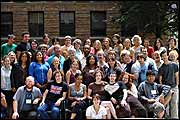Report on youth ministry urges new vision
Three-year review of Unitarian Universalist youth ministry completed; Board to hear report.
The report is the end result of the Consultation on Ministry to and with Youth, which was formed by the board in October 2004. The consultation recommends that the UUA and its congregations move away from “youth programming” and toward “youth ministry” in order to better serve young people in the Association.
Among the consultation’s 60 recommendations are these:
- That a resource book be created with readings, hymns, and activities for worship that appeal to youth.
- That theological schools be invited to provide education in youth ministry and that the Ministerial Fellowship Committee require such coursework in credentialing new ministers.
- That a training be developed that will help youth talk about Unitarian Universalism with their friends.
- That antiracist, antioppressive, and multicultural youth curricula be developed to ensure that all youth are welcome in our congregations.
- That quality training be provided for those who work with youth.
- That eight congregations be identified and supported in creating models of multigenerational worship.
The summary report’s 60 recommendations are gathered into six categories: “Meeting the Spiritual Needs of Youth,” “Welcoming All Youth in a Multicultural World,” “Building a Multigenerational Faith,” “Organizing Youth Ministry for Success,” “Moving Beyond a One-Size-Fits-All Ministry,” and “Preparing and Supporting Adults for Youth Ministry.”
During the past three years the Consultation on Ministry to and with Youth convened more than 90 meetings with UU groups in the United States and Canada. In addition, more than 100 congregations have held “congregational conversations” about youth ministry. The consultation surveyed 1,400 youth and a smaller number of adults who work with youth. Members of the consultation included both youth and adults. Coconvenors of the consultation were Megan Dowdell, then a youth trustee-at-large on the board, and UUA President William G. Sinkford.
On October 20, the consultation will present its final report to the UUA Board of Trustees. But that’s not the end of the process, said Sara Eskrich, a UUA Youth Ministry Associate and current staff facilitator to the consultation. Beth Dana, whose term as a Youth Ministry Associate ended earlier this year, facilitated the consultation process for more than two years.
Following the three-year consultation, 60 consultation participants met in a five-day Summit on Youth Ministry in July at Simmons College in Boston. This group developed the recommendations that have come out of the consultation on how the board, UUA staff, congregations, and youth might proceed in creating a more vital youth ministry across the Association.
The recommendations are addressed to both the Board of Trustees and the UUA administration. Eskrich said the administration is expected to appoint a Youth Ministry Working Group, which will consider how to move forward with recommendations in the plan. “That group will be in charge of prioritizing the next steps,” she said, “deciding where we go from here, what we put our time and energy into as an Association.” It will also be partnering with interested groups to implement changes in youth ministry.
The other part of the plan is to invite congregations to continue talking about what they can do, Eskrich said. “All of the conversations that congregations have had during the consultation, including the district gatherings, have started ideas flowing. Now congregations will be taking this information, and our report, and determining how to best use it.”
“The real relevance of this consultation is the taking it back to the congregations,” Eskrich said. “And looking at ways of making youth ministry more than the youth group on Sunday morning. We’re looking at a real definition of ministry.”
“For youth on Sunday mornings many of our congregations have had a certain door for youth—the youth group door,” she continued. “We need to change the culture of congregations so youth are really welcomed into the front door of the church and have every opportunity to serve on committees, in choir, on the governing board, and participate in social justice and worship.”
The survey of youth done during the consultation found that many youth are not interested in the style of Sunday worship at their congregations. Youth said they often have more intense spiritual experiences at district youth events than in their own congregations. More than 40 percent believed youth programs were not a priority in their congregations. Transracially adopted youth indicated less of a feeling of belonging than other youth.
Eskrich said congregations don’t have to wait on UUA staff to develop programs from the consultation. “We’re encouraging congregations to move ahead on their own. We want them to read the reports, talk with their district staff, and determine how they can improve their own youth ministries right now.”
See sidebar for links to related resources, including the complete text of the Summit on Youth Ministry Report and the results of the three-year study of the Consultation on Ministry to and with Youth.








